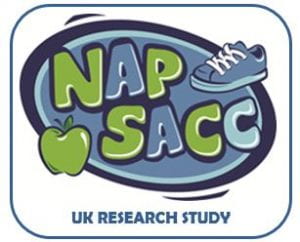Pre-school children in the UK are not meeting national guidelines for physical activity or nutrition.
An increasing number of young children start primary school experiencing overweight or obesity which can have a negative impact on their health and development as they grow older. Previous research has shown that differences in the environment in which children spend their time can affect how much weight they gain. It is very difficult to make changes to children’s home environments, so a programme called NAP SACC (Nutrition and Physical Activity Self-Assessment for Child Care) aims to provide support to nurseries to help them to make their nurseries as healthy as they can be for the children who attend them.
The programme is being used very successfully in the United States, but it is not yet known how well NAP SACC might work in the UK. This study aims to test whether the NAP SACC programme would be useful for UK nurseries. We have adjusted the programme so that it is suitable for UK nurseries (NAP SACC UK) and have tested it in nurseries on a smaller scale (12 nurseries). When we did this, nursery managers and parents told us they were happy with the programme and the measurements we took. We now need to do a larger study to see if NAP SACC UK is effective at supporting nurseries to make changes that work to improve children’s health.
To find out more about the research conducted at the Centre for Public Health please see here
Who is taking part?
Approximately 56 Early Years Settings from multiple areas across England and Scotland will take part in the trial. The NAP SACC UK study will randomly divide the nurseries in to two equal groups. One group will receive the NAP SACC UK programme and one group will continue with their usual practice and plans.
There will be approximately 784 children aged 2 years or above taking part. These are children who attend the nursery for at least 12 hours per week across the year or 15 hours per week in term time, and whose parents have given their permission for them to be involved in the study.

